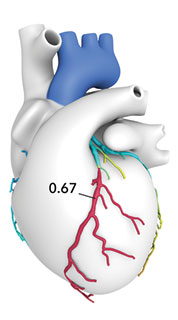JERSEY CITY, NJ – December 17, 2021 – Jersey City Medical Center (JCMC), an RWJBarnabas Health facility, has expanded its extensive cardiovascular program by using artificial intelligence to evaluate heart disease. The low-risk minimally invasive procedure, called Fractional Flow Reserve – Computed Tomography (FFR-CT), assists doctors in determining whether patients have coronary artery disease.
Jersey City Medical Center now joins its sister facilities, Monmouth Medical Center Southern Campus in Lakewood and Newark Beth Israel Medical Center in Newark, in offering FFR-CT.
 Using the technology, which relies on data from computed 3D model scans of a patient’s heart, FFR-CT calculates how much blood is flowing through the coronary arteries. These arteries supply blood to the heart. There are no incisions and only moderate sedation.
Using the technology, which relies on data from computed 3D model scans of a patient’s heart, FFR-CT calculates how much blood is flowing through the coronary arteries. These arteries supply blood to the heart. There are no incisions and only moderate sedation.
The procedure can help determine whether patients have blockages that typically occur with coronary artery disease (CAD). The color-coding on the 3D scan can show the severity of a blocked artery, which can help a doctor determine whether a patient should undergo lifestyle changes, be given medication, or if a stent or surgery is the best approach.
“Until now, the functional significance of heart artery blockages and the need for angioplasty and stents required invasive cardiac catheterization,” said Mitchell Baruchin, MD, Attending Cardiologist and Co-Director of the Echo Lab. “FFR-CT is the only non-invasive test that can both see artery blockages as well as check for impact on blood flow. It’s FDA approved and covered by insurance.”
CAD, the leading cause of death for both men and women in the United States, develops when the arteries leading to the heart narrow or become blocked. When this happens, it leads to reduced blood flow to the heart, causing chest pain, heart attacks, and possibly death. However, even though CAD is the most common form of heart disease, many non-invasive tests in the market don’t have high accuracy rates in detecting the illness.
FFR-CT provides physicians with highly accurate and detailed information, which previously could only be detective through invasive procedures.
“We can now give our patients a more accurate diagnosis without putting them through more invasive tests,” says Mary Abed, MD, Chief of Cardiology. “This gives everyone peace of mind.”
To determine eligibility and for more information, call 201-915-2256 or visit FFR-CT.
About Jersey City Medical Center
Jersey City Medical Center (JCMC), an RWJBarnabas Health facility, is Healing, Enhancing, and Investing in Hudson County. It is a comprehensive full-service acute and sub-acute care 348-bed teaching hospital. A not-for-profit hospital, JCMC is a state-designated Level II Regional Trauma Center with close to 16,000 admissions and over 80,000 Emergency Department visits annually. The hospital specialty services include maternity, orthopedics, heart and vascular care, and behavioral health. JCMC is the only full-service heart hospital in Hudson County, offering access to outstanding cardiologists and sophisticated and advanced treatments, such as cardiac surgery and Transcatheter Aortic Valve Replacements (TAVR). RWJBarnabas Health and Jersey City Medical Center are in partnership with Rutgers Cancer Institute of New Jersey – the state’s only NCI-designated Comprehensive Cancer Center. JCMC is also a state designated stroke center, a regional comprehensive cardiac center, a perinatal intensive care center, a regional level 3 neonatal intensive care unit for critically ill newborns, and home to the most advanced robotic-assisted surgical program in Hudson County. JCMC, a provider of Advanced Life Support for Hudson County, runs 911 Medical Call Screening for Hudson County and operates one of the state’s busiest EMS systems.